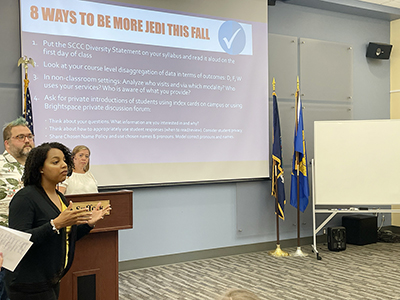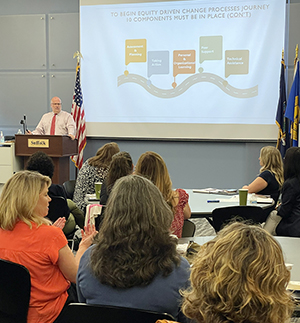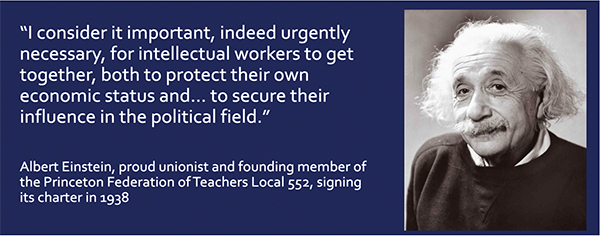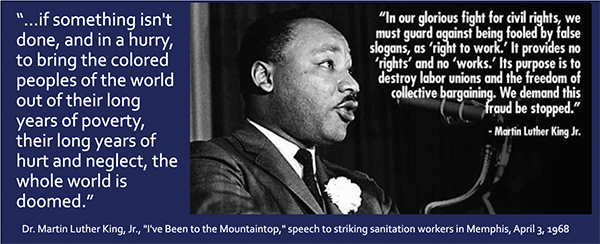Cynthia Eaton and Christina Vargas
Enlightening — Empowering These are just a few adjectives from some of our 34 participants used to describe this summer’s JEDI Institute. These colleagues voluntarily gave their time during three five-hour campus sessions on June 28, July 12 and July 26, along with homework in between, and are developing fall projects to advance the JEDI mission. An FA-administration collaboration, the JEDI Institute is a professional development program that aims to make SCCC more just, equitable, diverse and inclusive or “JEDI.” This summer, our program was enhanced as participants heard presentations from SCCC President Bonahue in session 1, former Grant Campus Dean Jim Keane in session 2 and from Dr. Audeliz Matias, interim chief diversity officer and professor of geosciences at SUNY Empire State College, in session 3. Having worked through our pilot program last year and listened carefully to this year’s participants, our executive board has heard a number of common myths about DEI initiatives like JEDI which we’ll address in this article.
MYTH: DEI programs like JEDI expect us to lower our standards just to help more minorities pass our classes. FACT: JEDI asks that faculty maintain appropriate, current and high academic standards but also focus on giving every student the support they need to have equal opportunity to achieve those standards. The JEDI program has been crystal clear on this from the start: We are not asking anyone to lower their standards. That’s not at all what JEDI is about. Lowering standards does not serve any student well. What JEDI asks is that faculty reassess their standards and make sure they remain aligned with best practices in your discipline, as required by SUNY and Middle States and as recommended by the American Association of Colleges & Universities (AAC&U) and other national education organizations. Further, JEDI asks that you think about the type and number of assessments built into each of your courses. One midterm and one final exam does not give students an opportunity to practice showing what they know and receiving feedback to improve. A handful of quizzes and one final exam that are all automatically graded in Brightspace or through the textbook publisher is likewise insufficient. Research is clear that, especially at a community college, a variety of types of assessment is best. Some participants’ JEDI projects are to review their assessment strategies and develop more and different ways for students to demonstrate mastery of the student learning outcomes—without lowering their standards. Rather than lowering standards, JEDI is about inclusive excellence. MYTH: I can't do this JEDI stuff because I have too much content to cover in my class. FACT: If you have lots of content to cover, you are exactly the instructor who should be doing JEDI work. Your content is too important for students to not be comprehending it fully. A frequent response we hear from faculty about JEDI is that, while they feel the program is important and support it in principle, they simply cannot do anything differently in their own classes because, they say, “I just have too much content to cover.” “I run out of time each semester,” these faculty explain, “and I can’t fail to cover all the content because students really need it for the next class in our program sequence.” Here’s what happens in JEDI, though. We see faculty who come to realize that it’s less important to plow through “all the content I have to cover” than to slow down, adjust assessments and provide more support structures to better ensure that students are truly mastering the concepts in the 101-level class so that they are better equipped to succeed when they hit the second class in the sequence. Even within your class, if you give a quiz at the end of unit 1 and see that a notable percentage of your students didn’t fare well, wouldn’t it be better to devote a class period to ensuring all those students truly comprehend your material rather than just move forward because that’s how it is on your calendar? We know you have a lot of content. But better establishing the most fundamental, core concepts of your class gives more students the skills they need when they go to the academic skills center for tutoring or review the videos you have posted on their own, etc., to get up to speed. JEDI’s goal is to help faculty avoid moving through the chapters and units lock step even as students are falling behind or failing. It is about integrating practices into your pedagogy and existing courses that enhance learning. We are happy to help you find ways to ensure that, precisely because we know that you love to teach and you want all of your students to succeed. MYTH: JEDI is divisive; it teaches white middle-class people to be ashamed of being white and middle class, and I don't want to do that to myself or my students. FACT: The "I" in JEDI stands for inclusive. JEDI is about neither divisiveness nor shame. This is a common misunderstanding about DEI programs in general, not just JEDI. There are a number of opposing concepts within diversity, equity and inclusion, which Nicholas C. Burbules of the University of Illinois at Urbana-Champaign explicates so well in his April 15, 2021, Inside Higher Ed piece titled “Antinomies in the Concepts of Diversity, Equity and Inclusion:”
The JEDI program strikes a balance between the two. We believe that the answer to hurtful speech is more speech, but at the same time every single member of our college community deserves to feel safe and welcome. We work diligently to walk that fine line throughout the JEDI program, and we absolutely are not interested in inciting a sense of shame or guilt in anyone. We are interested in increasing everyone’s opportunities to develop awareness and understanding. MYTH: I cannot be JEDI because I don't know enough about it, I don't feel comfortable and I fear I'll say something wrong. FACT: If you genuinely care about students—about all students—and don't actively harbor racist, sexist, homophobic or other bigoted assumptions about your students, you are being JEDI. At its very core, the JEDI Institute is about being more effective in our work with students. It is that simple. The JEDI Institute is about better retaining students and helping all students succeed, with of course particular attention to racially and otherwise minoritized students since data shows their outcomes are not on par with non-minoritized students and that absolutely merits our dedicated attention. If you don’t feel you know enough yet, you can learn. Learning, discussing, self-reflecting and growing are all part of the JEDI Institute. It’s okay to feel a bit uncomfortable; we can learn to work through the discomfort. We’ve all made missteps, but when it happens we apologize and do the work to learn better—and then do better. MYTH: The FA shouldn't be involved in things like JEDI. Unions should stick to bread and butter issues like wages and working conditions and should leave all things academic to governance. FACT: First, the FA Constitution clearly identifies the union's purpose as to "foster educational excellence" and to "represent the community of interests" of our unit. Second, there's a long connection between the labor movement and social justice movements in our nation's history. This reflects a misunderstanding of what unions are and do. Right in Article II of the FA Constitution, you see the two objectives of our union, which are to advocate for SCCC students to foster educational excellence and to represent the interests of our bargaining unit. We take this to mean fostering educational excellence for all students. And if institutional data shows that specific groups of students are not succeeding, we need to pay attention to that so we can work to foster educational excellence for all. Also, for over a century, academic and other unions have done social justice work and, as you can see in the images here, some pretty smart Americans have argued that academics absolutely should unionize and engage in political activism.
The American Federation of Teachers, our national parent union, was one of the first to extend full membership to Black teachers—and from as early as 1918 argued for equal pay for Black teachers. In 1954, the AFT was the only union to file an amicus brief in the historic Brown v. BOE Supreme Court case. In 1963, labor unions including AFT supported the March on Washington for Jobs and Freedom where Dr. King gave his historic “I Have a Dream” speech. And if you know your history, you know that Dr. King was an ardent unionist who was assassinated in Memphis in 1968 after giving a speech to striking sanitation workers—and who argued that economic, political and social justice work are all inseparable in the fight for a more just, equitable, diverse and inclusive America. So by being JEDI you are carrying on an important and proud aspect of FA history—and American history. |



